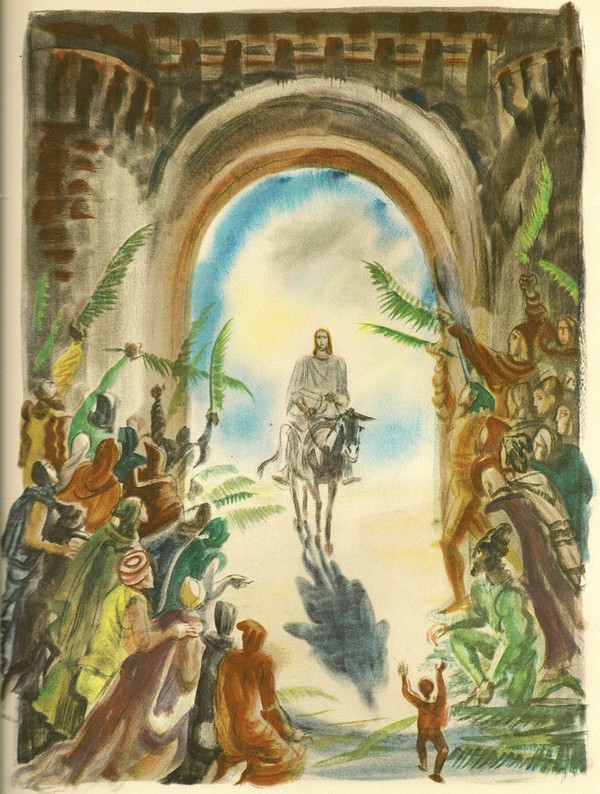
Today’s hymn from Sing Praise is, unusually for this hymn book, one intended mainly for children. “There’s a man riding in on a donkey” is a telling of the Palm Sunday story set to the tune of an established favourite baptism song, “give me oil in my lamp”. This is no doubt because the chorus of the original – “Sing hosanna to the King of Kings” – is the chant always associated with Palm Sunday, as sung by the crowds welcoming Jesus into Jerusalem. (incidentally, I didn’t bother to write a blog post for yesterday’s song, as the words of ‘Sanna Sannanina’ are just that, ‘Hosanna’ in an unspecified ‘South African’ language).
The words of the verses explain simply that this “man riding in on a donkey” is in fact a king, but (verse 2) “why a king wearing no fine crown? Where the drums, where the high-sounding cymbals if a king is riding into town?” The question isn’t really answered in the text of the song, as verse 3 moves straight to “the joy of the news he brings” and proclaiming Jesus as “the Son of the Highest, the King of Kings”.
Why is the question not answered? Because this Sunday’s theme is seen as more accessible to children than the rest of the events of Holy Week and those who write songs or plan services want to keep things simple and happy for their sake. The correct answer to “why a king wearing no fine crown?” is around the understanding of leadership that Jesus demonstrated, leadership that is not only humble and willing to serve those he leads, but even to die for them. It’s easier to have songs and activities around someone riding a donkey and others waving greenery and singing “hosanna!” than it is to arrange something age-appropriate around the arrest, trial, torture and death of an innocent man.
Even many adult Christians find it easier to stick to the joyful themes of Palm Sunday and Easter morning and pay less attention to the events in between. Clergy often complain how few people turn up for Maundy Thursday footwashing and Good Friday reflections – even though Friday is still a public holiday, even in our largely secular society, and most people will have the day off work. It takes more of an effort to enter into the sombre mood of the days leading up to the Crucifixion, all the more so when that secular society is unaware. I heard someone in a Zoom meeting yesterday telling of the shock he felt at the contrast between the silent reflection of a Holy Week retreat, and the busyness and jollity of the crowds he found back in town when it ended on Good Friday evening.
But it was no different in Jesus’ day – the crowds had gathered in Jerusalem for Passover and most of them were probably there for the jollity, to meet up with friends and relations, to take part in the Passover meal where I expect more than a few sips of wine were drunk to celebrate the people’s freedom. But you can’t celebrate Passover properly without remembering the slavery from which the Hebrews were freed, and you can’t celebrate Easter properly without having remembered the tragic events leading up to it.